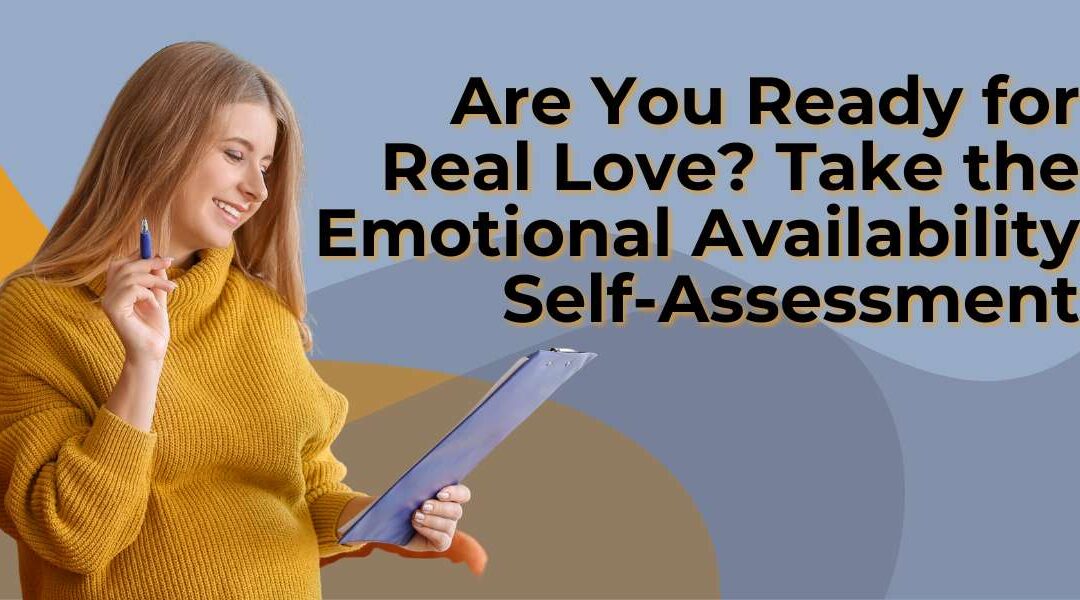You say you want a real relationship.
Not just something casual, not another confusing situationship—but deep, secure, supportive love.
So here’s the honest question:
Are you emotionally available enough to receive it?
This self-assessment isn’t about blame. It’s about clarity. Because before you go looking for a secure partner, you have to know if you’re ready for one.
Let’s take a closer look at what emotional availability really means—and then walk through a simple quiz that can help you identify where you stand.
What Does It Mean to Be Emotionally Available?
It’s not about crying easily. Or trauma-dumping on a first date. Or saying “I love you” fast.
Emotional availability is your capacity to give and receive emotional connection with safety, consistency, and vulnerability.
It’s about:
- Letting someone in even when it feels risky
- Responding (not just reacting) when hard feelings come up
- Naming your needs instead of expecting someone to guess them
- Listening without defensiveness when someone else is in pain
If you struggle with those things, you’re not alone—and you’re not broken. But it may be a sign that you’re not yet available for the love you want.
Let’s find out where you land.

Emotional Availability Self-Assessment (Mini Version)
Grab a pen or open your Notes app. For each statement below, answer:
A = Always
S = Sometimes
R = Rarely
Self-Awareness
- I can usually identify what I’m feeling.
- I understand how my past experiences affect my current relationships.
- I recognize when I’m withdrawing, shutting down, or getting defensive.
Vulnerability
- I can share my fears or insecurities without shame.
- I feel safe expressing sadness or hurt to a partner.
- I don’t avoid tough conversations just to keep the peace.
Responsiveness
- I listen to others without immediately offering solutions or defensiveness.
- I stay emotionally present when someone is upset.
- I can hold space for both my emotions and theirs at the same time.
Boundaries
- I know how to say no without guilt.
- I can hear someone else’s boundary without taking it personally.
I understand the difference between emotional intimacy and emotional enmeshment.
Interpreting Your Results
- Mostly A’s = You’re emotionally available and relationship-ready. Keep deepening your skills.
- Mostly S’s = You’re in process. You have awareness, but likely need to build consistency and safety.
- Mostly R’s = There may be deeper fear or patterning that’s keeping you closed off.
Want a deeper breakdown? Use the emotional availability self-assessment for a full quiz with next steps.

Why This Matters
Emotionally unavailable people often aren’t bad partners—they’re unready partners. And if you’re not clear on your own patterns, you’ll keep attracting that dynamic.
If you scored mostly “Sometimes” or “Rarely,” don’t panic. Emotional availability is a skill. You can learn it. But it starts with telling the truth to yourself.
What to Do Next
If this post hit close to home, here’s where to start:
- Read about the signs of emotional unavailability
- Reflect on how you’ve handled vulnerability in past relationships
- Try journaling or therapy to explore avoidance, fear, or over-functioning
- Begin practicing soft disclosures in safe relationships
- Learn how to build emotional intimacy step by step
And most importantly—know this:
You’re worthy of a love that feels safe. But safety starts inside you.

Want Supportive, Two-Way Relationships?
Download my free PDF: The Four Key Needs for a Successful Relationship—and apply it to every relationship in your life.
👉 Download your guide now → https://offers.christinekniffen.com/four-key-needs-for-a-successful-relationship


